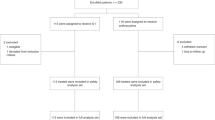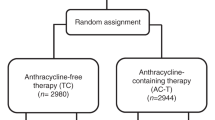Abstract
The purpose of the study was to determine the response rates (RR) and duration to second- and third-line chemotherapy programmes in patients with anthracycline-resistant breast cancer, utilizing various definitions of anthracycline resistance. This was a retrospective analysis performed on 1335 patients with metastatic breast cancer who participated in consecutive clinical trials of first line, anthracycline-containing combination chemotherapy (ACCC) at the University of Texas MD Anderson Cancer Center between July 1973 and April 1980. Anthracycline-resistant groups were identified using definitions of anthracycline resistance found in the literature: progressive disease as best response to ACCC (Group 1, n = 56 patients); progressive disease while receiving ACCC after an intervening response to the drug (Group 2, n = 84); progressive disease within 6 months of last dose of ACCC (Group 3, n = 233); and progressive disease within 12 months of last dose of ACCC (Group 4, n = 272). Second- and third-line therapies administered to these patients included methotrexate, doxorubicin, mitoxantrone, bisantrene, vinblastine, vindesine, melphalan, mitomycin, cisplatin, etoposide and others, but not taxanes. The distribution of patients' characteristics was similar between the four groups, as was the use of second- and third-line regimens. Response rate (RR) to second-line chemotherapy were 5% and 7.7% for Group 1 and Group 2 respectively. In contrast, RR to second-line chemotherapy were 21.6% and 15% for Group 3 and 4. The differences in response rate between the combination of Groups 1 and 2 and Groups 3 or 4 were significant (P = 0.005 and P = 0.04 respectively). These results indicate that strictly defined anthracycline resistance as defined in Groups 1 and 2 is associated with resistance to many other cytotoxic drugs. The definitions used in Groups 3 and 4 include many patients with responsive tumours, and a more favourable prognosis. © 2000 Cancer Research Campaign
Similar content being viewed by others
Article PDF
Change history
16 November 2011
This paper was modified 12 months after initial publication to switch to Creative Commons licence terms, as noted at publication
References
Creech R, Catalano R, Shah M and Dayal H (1993) An effective low-dose mitomycin regimen for hormonal- and chemotherapy-refractory patients with metastatic breast cancer. Cancer 51: 1034–1040
Degardin M, Bonneterre J, Hecquet B, Pion JM, Adenis A, Horner D and Demaille A (1994) Vinorelbine (Navelbine) as a salvage treatment for advanced breast cancer. Ann Oncol 5: 423–426
De Vita V (1993) Biochemical resistance to chemotherapy is the major impediment to successful treatment. In: Cancer: Principles and Practice of Oncology, De Vita V, Hellman S, Rosenberg S (eds), pp. 281–283. Lippincott: Philadelphia
Henderson C (1991) Chemotherapy for metastatic disease. In: Breast Disease, Harris J, Hellman S, Henderson C, Kinne D (eds), pp. 604–665. Lippincott: Philadelphia
Holmes A, Valero V, Walters R, Theriault R, Booser D, Fraschini G, Buzdar A, Frye D, Gibbs H and Hortobagyi G (1993) The MD Anderson Cancer Center experience with Taxol in metastatic breast cancer. Cancer 15: 161–169
Hortobagyi G (1995 a) Management of breast cancer: status and future trends. Semin Oncol 22: 101–107
Hortobagyi G (1995 b) Future directions for vinorelbine (Navelbine). [Review]. Semin Oncol 22: suppl 2: 80–86
Hortobagyi G and Buzdar A (1991) Locally advanced breast cancer: a review including the MD Anderson experience. In: High-risk Breast Cancer, Ragaz J, Ariel I (eds pp. 382–415. Springer-Verlag: Berlin
Hortobagyi G and Buzdar A (1993) Present status of anthracyclines in adjuvant treatment of breast cancer [Review]. Drugs 45, suppl 2: 10–19
Hortobagyi G and Buzdar A (1995) Current status of adjuvant systemic therapy for primary breast cancer: progress and controversy. CA Cancer 45: 199–226
Hortobagyi G, Smith T, Legha S, Swenerton K, Gehan E, Yap H, Buzdar A and Blumenschein G (1983) Multivariate analysis of prognostic factors in metastatic breast cancer. J Clin Oncol 12: 776–786
Jones S, Winner E, Vogel C, Laufman L, Hutchins L, O'Rourke M, Lembersky B, Budman D, Bigley J and Hohneker J (1995) Randomized comparison of vinorelbine and melphalan in anthracycline-refractory advanced breast cancer. J Clin Oncol 13: 2567–2574
Kaplan E and Meier P (1958) Non-parametric estimation from incomplete observations. J Am Stat Assoc 53: 457–481
Mantel N (1966) Evaluation of survival data and two new rank order statistics arising in its consideration. Cancer Chemother Rep 50: 163–170
Munzone E, Capri G, Fulfaro F, Tarenzi E, Caraceni A, Villani F, Spreafico C, Laffranchi A, Crabeels D and Gianni L (1994) Paclitaxel by 3 H schedule in relapsed breast cancer resistant to anthracycline. Ann Oncol 5: 43 (abstract 212)
Nabholtz J, Gelmon K, Bontenal M, Spielmann M, Clavel M, Seeber S, Conte P, Boneterre J, Fumoleua P, Slukes A, Sauter C, Roche H, Calvert H, Kaufman J, Chazard M, Diergarten K, Gallant G, Thompson M, Winograd B and Onetto N Bristol-Myers Squibb Taxol Study Group (1993) Randomized trial of two doses of taxol in metastatic breast cancer: an interim analysis. Proc Am Soc Clin Oncol 12: 60 (abstract 42)
Pivot X, Asmar L and Hortobagyi G (1999) The efficacy of chemotherapy with docetaxel and paclitaxel in anthracycline-resistant breast cancer. Int J Oncol 15: 381–386
Radvin P, Burris H, Cook G, Eisenberg P, Kane M, Bierman W, Mortimer J, Genevois E and Gellet R (1995) Phase II trial of docetaxel in advanced anthracycline-resistant or anthracenedione-resistant breast cancer. J Clin Oncol 13: 2879–2885
Seidman A, Norton L, Reichman B, Crown J, Yao T, Heelan R, Hakes T, Lebwohl D, Gilewski T and Surbone A (1993) Preliminary experience with paclitaxel plus recombinant human granulocyte colony-stimulating factor in the treatment of breast cancer. Semin Oncol 20: 40–45
Valero V, Holmes F, Waters R, Theriault R, Esparza L, Fraschini G, Fonseca G, Bellet R, Buzdar A and Hortobagyi G (1995) Phase II trial of docetaxel: a new, highly effective antineoplasic agent in the management of patients with anthracycline-resistant metastatic breast cancer. J Clin Oncol 13: 2886–2894
Vermoken JB, Ten Bokkel Huinink W, Mandjes I, Postman T, Huizing T, Heimans J, Beijnen J, Bierhorst F, Winograd B and Pinedo H (1995) High dose paclitaxel with granulocyte colony-stimulating factor in patients with advanced breast carcinoma refractory to anthracycline therapy: a European Cancer Center trial. Semin Oncol 22: 16–22
Walters R, Frye D, Buzdar A, Holmes F and Hortobagyi G (1992) A randomized trial of two dosage schedules of mitomycin C in advanced breast carcinoma. Cancer 69: 476–481
Wilson W, Berg S, Bryant G, Wittes R, Bates S, Fojo A, Steinberg S, Goldspiel B, Herdt J, O'Shaughnessy J, Balis F and Chabner B (1994) Paclitaxel in doxorubicin-refractory or mitaxantrone refractory breast cancer: a phase I/II trial of 96-hour infusion. J Clin Oncol 12: 1621–1629
Yau J, Yap Y, Buzdar A, Hortobagyi G, Bodey G and Blumenschein G (1985) A comparative randomized trial of vinca-alcaloïds in patients with metastatic breast carcinoma. Cancer 55: 337–340
Author information
Authors and Affiliations
Rights and permissions
From twelve months after its original publication, this work is licensed under the Creative Commons Attribution-NonCommercial-Share Alike 3.0 Unported License. To view a copy of this license, visit http://creativecommons.org/licenses/by-nc-sa/3.0/
About this article
Cite this article
Pivot, X., Asmar, L., Buzdar, A. et al. A unified definition of clinical anthracycline resistance breast cancer. Br J Cancer 82, 529–534 (2000). https://doi.org/10.1054/bjoc.1999.0958
Received:
Revised:
Accepted:
Published:
Issue date:
DOI: https://doi.org/10.1054/bjoc.1999.0958
Keywords
This article is cited by
-
CTCs-oriented adjuvant personalized cytostatic therapy non-metastatic breast cancer patients: continuous non-randomized prospective study and prospective randomized controlled study
Breast Cancer Research and Treatment (2021)
-
Pegylated liposomal doxorubicin in patients with metastatic triple-negative breast cancer: 8-year experience of a single center
Journal of the Egyptian National Cancer Institute (2020)
-
Chemotherapy in Patients with Anthracycline and Taxane-Pretreated Metastatic Breast Cancer: An Overview
Current Breast Cancer Reports (2013)
-
New Microtubule Inhibitors in Breast Cancer
Current Breast Cancer Reports (2013)
-
A multicenter phase II trial of docetaxel plus gemcitabine as salvage treatment in anthracycline- and taxane-pretreated patients with metastatic breast cancer
Cancer Chemotherapy and Pharmacology (2012)



